GESE FOUR
高中英语必修4单词表(带音标)
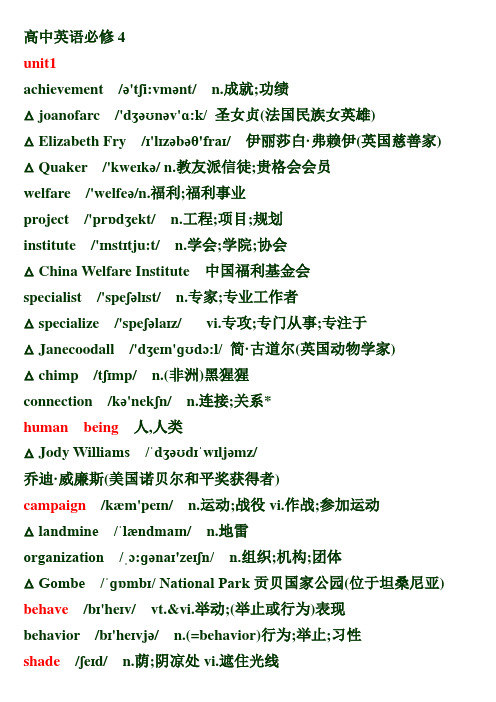
高中英语必修4unit1achievement /ə'tʃi:vmənt/ n.成就;功绩△joanofarc /'dʒəʊnəv'ɑ:k/ 圣女贞(法国民族女英雄)△Elizabeth Fry /ɪ'lɪzəbəθ'fraɪ/ 伊丽莎白·弗赖伊(英国慈善家) △Quaker /'kweɪkə/ n.教友派信徒;贵格会会员welfare /'welfeə/n.福利;福利事业project /'prɒdʒekt/ n.工程;项目;规划institute /'ɪnstɪtju:t/ n.学会;学院;协会△China Welfare Institute 中国福利基金会specialist /'speʃəlɪst/ n.专家;专业工作者△specialize /'speʃəlaɪz/ vi.专攻;专门从事;专注于△Janecoodall /'dʒeɪn'ɡʊdɔ:l/ 简·古道尔(英国动物学家)△chimp /tʃɪmp/ n.(非洲)黑猩猩connection /kə'nekʃn/ n.连接;关系*human being人,人类△Jody Williams /ˈdʒəʊdɪˈwɪljəmz/乔迪·威廉斯(美国诺贝尔和平奖获得者)campaign/kæm'peɪn/ n.运动;战役vi.作战;参加运动△landmine /ˈlændmaɪn/ n.地雷organization /ˌɔ:ɡənaɪ'zeɪʃn/ n.组织;机构;团体△Gombe /ˈɡɒmbɪ/ National Park贡贝国家公园(位于坦桑尼亚) behave/bɪ'heɪv/ vt.&vi.举动;(举止或行为)表现behavior /bɪ'heɪvjə/ n.(=behavior)行为;举止;习性shade/ʃeɪd/ n.荫;阴凉处vi.遮住光线moveoff离去;起程;出发worthwhile /wɜ:θ'waɪl/ adj.值得的;值得做的nest /nest/ n.巢;窝bond /bɒnd/n.联系;关系;结合;纽带observe/əb'zɜ:v/ vt.观察;观测;遵守observation /'ɒbzə'veɪʃn/ n.观察;观测childhood /'tʃaɪldhʊd/ n.童年;幼年时代outspoken /aʊt'spəʊkən/ adj.直言的;坦诚respect/rɪ'spekt/ vt.&n.尊敬;尊重;敬意argue/'ɑ:ɡju:/ vi.&vt.讨论;辩论;争论argument /'ɑ:ɡjʊmənt/ n.争论;争辩;争吵entertainment /ˌentə'teɪnmənt/ n.款待;娱乐;娱乐表演Lead a...life过着...的生活crowd/kraʊd/ n.人群;观众vt.挤满;使拥挤crowd in (想法,问题等)涌上心头;涌入脑海inspire /ɪn'spaɪə/ vt.鼓舞;激发;启示△inspiration /ɪnspə'reɪʃn/ n.灵感;鼓舞support/sə'pɔ:t/ n.&vt.支持;拥护look down upon/on蔑视;瞧不起refer/rɪ'fɜ:/ vi.谈到;参考;查阅refer to查阅;参考;谈到audience /'ɔ:dɪəns/ n.观众;听众;读者by chance碰巧;凑巧come across(偶然)遇见;碰见△career /kə'rɪə/ n.事业;生涯rate /reɪt/ n.比率;速度sickness /'sɪknɪs/ n.疾病;恶心intend/ɪn'tend/ vt.计划;打算emergency /ɪ'mɜ:dʒənsɪ/ n.突发事件;紧急情况generation /dʒenə'reɪʃn /n.一代;一辈△determination /dɪˌtɜ:mɪ'neɪʃn/ n.决心;果断kindness /'kaɪndnəs/ n.仁慈;好意consideration /kənˌsɪdə'reɪʃn/ n.考虑;体谅deliver/dɪ'lɪvə/ vt.递送;生(小孩);接生;发表(演说等) carry on继续;坚持modest /'mɒdɪst/ adj.谦虚的;谦让的;适度的unit2statistic /stə'tɪstɪk/ n.(常用pl.statistics)数据;统计;统计数字;统计资料struggle/'strʌɡl/ vt.&vi.斗争;拼搏;努力decade /'dekeɪd/ n.十年;十年期super /'sju:pə/ adj.特级的;超级的△hybrid /'haɪbrɪd/ adj.混合的;杂种的n.杂交种;混血儿output /'aʊtpʊt/ n.产量;输出△strain /'streɪn/ n.(植物的)品种;种类3crop /krɒp/ n.农作物;庄稼;产量hunger /'hʌŋɡə/ n.饥饿;欲望vt.&vi.(使)饥饿disturbing /dɪs'tɜ:bɪŋ/ adj.引起烦恼的;令人不安的expand/ɪk'spænd/ vt.&vi.使变大;伸展circulate /'sɜ:kjʊleɪt/ vt.&vi.循环;流传Vietnam /vjet'næm/ n.越南(东南亚国家)thanks to幸亏;由于;因为battle /'bætl/ n.战役;战斗;较量;斗争vt.&vi.搏斗;奋斗rid /rɪd/ vt.摆脱;除去rid...of摆脱;除去be satisfied with对…感到满意freedom /'fri:dəm/ n.自由;自主would rather宁愿;宁可therefore/'ðeəfɔ:/ adv.因此;所以;因而equip /ɪ'kwɪp/ vt.&vi.装备;配备grain /'ɡreɪn/ n.谷物;粮食;颗粒export/ɪks'pɔ:t/ vt.&vi.输出;出口occupation /ˌɒkju'peɪʃn/ n.职业;工作;占领△personality /ˌpɜ:sə'nælətɪ/ n.性格;个性;人格confuse /kən'fju:z/ vt.使迷惑;使为难regret/rɪ'ɡret/ vt.遗憾;惋惜n.遗憾;懊悔chemical /'kemɪkl/ adj.化学的;关于化学的△organic /ɔ:'ɡænɪk/ adj.有机的;器官的;组织的△fertile /'fɜ:taɪl/ adj.肥沃的;富饶的△fertilizer /'fɜ:tɪlaɪzə/ n.肥料;化肥production /prə'dʌkʃn/ n.生产;制造(bacterium /bæk'tɪərɪəm/ 的复数形式)pest /pest/ n.害虫;害兽;害鸟build up逐步增强;建立;开发lead to 导致;造成(后果)nutrition /nju:'trɪʃn/ n.营养;滋养;食物mineral /'mɪnərəl/ n.矿物;矿石discovery /dɪs'kʌvərɪ/ n.发现;觉察focus/'fəʊkəs/ n.焦点;中心点vi.集中;聚焦focus on集中(注意力、精力等)于reduce/rɪ'dju:s/ vt.减少;减缩keep...free from/of使...免受(影响、伤害等);使...不含(有害物) △soybean /'sɔɪbi:n/ n.(=soyabean)大豆root /ru:t/ n.根;根源skim /skɪm/ vt.浏览;略读underline /ˌʌndə'laɪn/ vt.画底线标出;强调summary /'sʌmərɪ/ n.总结;摘要;概要comment/'kɒment/ n.评论;议论vi.&vt.表达意见;作出评论△producer /prə'dju:sə/ n.生产者;制片人5△industrial /ɪn'dʌstrɪəl/ adj.工业的;产业的unit3humour /'hju:mə/ n.幽默;滑稽△punchline /'pʌntʃlaɪn/ n.故事、笑话等中的妙语;关键语△Charlie Chaplin /'tʃɑ:lɪˈtʃæplɪn/ 查理·卓别林(英国喜剧大师) △Edward Lear /ˈedwəd'lɪə/ 爱德华·李尔(英国作家、画家)△vi ctorhugo /ˈvɪktəˈhju:ɡəʊ/ 维克多·雨果(法国文学家)up to now直到现在△brighten /'braɪtn/ vt.使更愉快;使更有希望△depressed /dɪ'prest/ adj.忧愁的;沮丧的contentfeel/be content with对...满足performer /pə'fɔ:mə/ n.表演者;演出者fortunate /'fɔ:tʃənɪt/ adj.幸运的;吉利的badly off穷的;缺少的△teens /ti:nz/ n.十几岁(13至19岁的年龄)ordinary /'ɔ:dənərɪ/ adj.平常的;普通的△subtle /'sʌtl/ adj.微妙的;精巧的;技艺精湛的entertain/ˌentə'teɪn/ vt.&vi.使欢乐;款待△entertaining /ˌentə'teɪnɪŋ/ adj.愉快的;有趣的△charming /'tʃɑ:mɪŋ/ adj.迷人的;有魅力的△tramp /træmp/ n.流浪汉;行乞者thr oughout /θru:'aʊt/ prep.普及;贯穿adv.到处;始终;全部homeless /həʊmləs/ adj.无家的;无家可归的worn /wɔ:n/ adj.用旧的;用坏的;破烂的△worn-out /wɔ:n'aʊt/ adj.磨破的;穿旧的△stiffly /'stɪflɪ/ adv. 僵硬地failure /'feɪljə/ n. 失败(者)optimism /'ɒptɪmɪzəm/ n.乐观;乐观主义overcome/ˌəʊvə'kʌm/ vt.(overcome;overcome)战胜;克服△underdog /'ʌndədɒɡ/ n.失败者;处于劣势的一方leather /'leðə/ n.皮革pickout挑出;区分出△lace /leɪs/ n.饰带;花边;鞋带cut off切断;断绝chew /tʃu:/ vt.&vi.嚼碎;咀嚼(食物)△mouthful /'maʊθfʊl/ n.一口;满口△enjoyment /ɪn'dʒɔɪmənt/ n.享受;快乐;乐趣7convincedirect /dɪ'rekt;daɪ'-/ vt.&vi.导演;指示;指挥adj.直的;直接的;直率的star in担任主角;主演outstanding /aʊt'stændɪŋ/ adj.突出的;杰出的; 显著的Switzerland /'swɪtsələnd/ n.瑞士(欧洲中部国家)△confidence /'kɒnfɪdəns/ n.信心;信念△costume /'kɒstju:m/ n.服装;戏装particular /pə'tɪkjʊlə/ adj.特殊的;特别的n.细节;细目particularly adv. 特殊地;特别地occasion /ə'keɪʒən/ n. 时刻;场合budget /'bʌdʒɪt/ n.预算;开支slide/slaɪd/ vi.&vt.(slid;slid)(使)滑动;(使)滑行n.滑;滑动;幻灯片amuse /ə'mju:z/ vt.使发笑;使愉快△amusingadj. 好笑的;有趣的pancake /'pænkeɪk/ n.烙饼;薄饼explanation /ˌeksplə'neɪʃn/ n.解释;讲解;说明△sherlockholmes /'ʃɜ:lɒk'həʊlmz/ 夏洛克·福尔摩斯mountainous /'maʊntɪnəs/ adj.多山的;山一般的whisper/'wɪspə/ n.耳语;低语vt.&vi.低语;小声说vast /vɑ:st/ adj.巨大的;辽阔的react/rɪ'ækt/ vi.作出反应;回应porridge /'pɒrɪdʒ/ n.粥;麦片粥unit4statement /'steɪtmənt/ n.陈述;声明greet /ɡri:t/ vt.&vi.迎接;问候represent/ˌreprɪ'zent/ vt.代表;象征association /əˌsəʊsɪ'eɪʃn/ n.社团;联系;联想flight /flaɪt/ n.航班;飞行△garcia /'ɡɑ:sɪə/ 加西亚(姓)approach/ə'prəʊtʃ/ vt.&vi.接近;靠近;走进n.接近;方法;途径defend/dɪ'fend/ vt.保护;保卫defend against保卫...以免受defence /dɪ'fens/ n.防御;保卫9misunderstand /ˌmɪsʌndə'stænd/vt.误解;误会(misunderstood;misunderstood) misunderstandingn. 误解;误会△akiranagata /ə'kɪrənə'ɡɑ:tɑ:/ 永田明△ahmedaziz /'ɑ:məd'ɑ:zɪz/ 艾哈迈德·阿齐兹Jordan /'dʒɔ:dn/ n. 约旦(西亚国家)Darlene Coulon /ˈdɑ:li:nˈkʊlɒŋ/ 达琳·库隆dash /dæʃ/ vt. 猛冲;突进adult /'ædʌlt;usə'dʌlt/ n. 成人;成年人adj.成人的;成熟的△simply /'sɪmplɪ/ adv.简单地;只△Muslim /ˌmʊzlɪm/ n.&adj.穆斯林(的),伊期兰教徒(的)unspoken /ʌn'spəʊkən/ adj.未说出口的;非口语的△posture /'pɒstʃə/ n.姿势;体态likelybe likely to 很可能...;有希望...in general总的说来;通常△frown /'fraʊn/ vi.皱眉;蹙额△misread /ˌmɪs'ri:d/ vt.(misread/mɪs'red/,misread)读错;误解function /'fʌŋkʃn/ n.作用;功能;职能vi.起作用;运转easeat ease舒适;快活;自由自在truly /'tru:lɪ/ adv.真实地;真诚地;真正地false /fɔ:ls/ adj.错误的;假的anger /'æŋɡə/ n.怒气;怒火lose face丢脸turn one's back to背对rank /ræŋk/ n.等级;军衔unit5theme /θi:m/ n. 题目;主题(曲)△Camelot /'kæməlɒt/ Park卡默洛特公园(位于英国) central /'sentrəl/ adj.中心的;中央的△centralpark中央公园(位于美国纽约)△dollywood /'dɒlɪwʊd/ n.多莱坞(公园名,位于美国) various /'veərɪəs/ adj.不同的;各种各样的cartoon /kɑ:'tu:n/ n.漫画;动画片11be famous for以...而闻名whichever /wɪtʃ'evə/ adv.无论哪一个;任何一个△pirate /'paɪərət/ n.海盗;盗版△fairy /'feərɪ/ tale神话故事;童话fantasy /'fæntəsɪ/ n.梦想;怪念头amusement /ə'mju:zmənt/ n.消遣;娱乐swing/swɪŋ/ n.秋千;摇摆vi.&vt.(swung,swung) 摇摆;摆动attraction /ə'trækʃn/ n.有吸引力的事物;吸引no wonder难怪;不足为奇的wherever /ˌweər'evə/ adv.&conj.无论在什么地方;各处unique /ju:'ni:k/ adj.独一无二的;仅有的△craftsman /'krɑ:ftsmən/ n.匠人;能工巧匠engine /'endʒɪn/ n.引擎;发动机△bald /bɔ:ld/ adj. 秃头的preservelength /leŋθ/ n.长度;长deed /di:d/ n.行为;事迹△knight /naɪt/ n.骑士;爵士be modelled after根据...模仿;仿造△Merlin the Wizard /'mɜ:lɪnðə'wɪzəd/ 魔术师梅林tournament /'tɔ:nəmənt/ n.锦标赛;联赛settler /'setlə/ n.移民;殖民者translator /trænz'leɪtə/ n.译员;翻译minority /maɪ'nɒrətɪ/ n.少数;少数民族△futuroscope /ˌfju:ˈtʃʊərəskəʊp/ 观测未来creature /'kri:tʃə/ n.生物;动物(=Tyrannosaurus Rex/taɪˌrænə'sɔ:rəs'reks/) advance/əd'vɑ:ns/ vi.&vt.前进;促进;提前in advance提前advanced /əd'vɑ:nst/ adj.高级的;先进的brand /brænd/ n.商标;牌子get close to接近come to life跃起来outing /'aʊtɪŋ/ n.外出;短途旅行;远足admission /əd'mɪʃn/ n.允许进入;入场费;承认shuttle /'ʃʌtl/ n.往返汽车;航天飞机13brochure /'brəʊʃə/ n.(作宣传或介绍用的)小册子;指南。
现代大学英语精读3 复习 总结

English S ummary PhrasesPart I学术生活 academic l ife民族认同 ethnic i dentity种族歧视 racial p rejudice伦理道德观念 ethical v alues政治上的成熟 political m aturity认同危机 identity c risis基因工程 genetic e ngineering偶然事件 chance e vents青少年阶段 adolescence s tage每日工作日程 daily a genda功能独立 functional i ndependence异性 the o pposite s ex生活方式 a w ay o f l ife获得知识 to a cquire k nowledge给这个词下定义 to d efine t he w ord对这种对待感到反感 to r esent t he t reatment确立自己的身份 to e stablish t heir i dentity使学生感到沮丧 to f rustrate t he s tudents宣战 to d eclare w ar拖着脚步 to d rag o ne’s f eet对结果进行评估 to e valuate t he r esult对知识进行加工 to p rocess k nowledge缩小差距 to n arrow t he g ap扩大业务 to e xpand b usiness装配汽车 to a ssemble c ars提出事实 to p resent f actsPart I I决定今天到此为止 to c all i t a d ay获得利益 to m ake p rofit改进性能 to i mprove p erformance停学 to q uit s chool做一笔交易 to m ake a d eal变本加厉重新开始 to s tart a gain w ith a v engeance 注册登记成立一家公司 to i ncorporate a c ompany组装一辆汽车 to a ssemble a c arto g ross(top/net) 10 m illion d ollars营业额达(总数超/纯利达)一千万美元开发产品 to d evelop p roducts营销产品 to m arket p roducts从中得到教训 to d raw a l esson f rom i t实现梦想 to r ealize a d ream捐钱 to d onate m oney游手好闲,不务正业 to f ool a round经济前景 business(economic) p rospects竞争优势 a c ompetitive e dge营业执照 business l icense库存和管理费 inventory a nd o verheads按客户需要配置的电脑 custom-‐made(personalized) c omputers 库存过多 surplus s tock/excess i nventory销售定额 a s ales q uota增值 added v alue零售价格 a r etail p rice千载难逢的机会 the o pportunity o f a l ifetime春假 spring r ecess财务和管理 finance a nd a dministration直销 direct m arketing会计基础 accounting b asics可以退货的保证 a m oney-‐back g uarantee现场服务 on-‐site s ervice市中心 a c ivic c enter犹太人集中的社区 the J ewish c ommunity终端用户 end u sersPart I II继续去写她的东西 to r esume h er w riting流露他的真情 to b etray h is t rue f eelings引起巨大愤怒 to a rouse g reat a nger出自己的洋相 to m ake a f ool o f o neself通知相关的所有人 to i nform e veryone c oncerned问讯 to m ake i nquires遭受巨大痛苦 to s uffer a t errible p ain扔一块石头 to p itch a s tone(因为重要)专门去做某事 to m ake a p oint o f d oing s omething侵犯我的隐私 t o i nfringe o n m y p rivacy放弃研究 to a bandon t he r esearch上一个新项目 to l aunch a n ew p roject重新做人 to s tart o ne’s l ife a fresh采纳一种新方法 to a dopt a n ew m ethod挑起激烈的反应 to p rovoke a v iolent r eaction找回自己丢失的车 to r ecover o ne’s m issing c ar涉及到和各种人打交道 to i nvolve d ealing w ith a ll k inds o f p eoplePart I V将人民币换成外币 t o c onvert C NY i nto f oreign c urrency寻找真理 to s eek t he t ruth抛掉旧的传统 to d iscard t he o ld t raditions讽刺人的虚荣 to s atirize h uman v anity在那岛上住人 to i nhabit t hat i sland钦佩他们的勇气 to a dmire t heir c ourage玩忽职守 to n eglect o ne’s d uty逃避后果 to e scape t he c onsequences挡路 to b lock o ne’s w ay毁掉名誉 to r uin o ne’s r eputation年久失修的防御工事 neglected f ortificationsa s quatter’s h ut擅自占用土地的人搭建的临时简陋房子容易变质的东西 perishable g oods社会习俗 conventions o f s ociety摇摇晃晃、头重脚轻的酒鬼 tottering d runks当前的风云人物 the m an o f t he h our英雄人物 heroic f igures一种带有使命感的神态 an a ir o f d estiny看人时如火一般的眼光 a w ar s care雨点般的石头 a s hower o f s tones一小撮捣乱分子 a h andful o f t rouble-‐makersPart V塑造年轻人的心灵 to m old y oungsters’ t hinking涂上黄油 to s pread b utter污染环境 to c ontaminate t he e nvironment缓和口气 to m odify t he t one造成未曾料到的伤害 to w ork u nknown h arm创造奇迹 to w ork m iracles获得权力 to a cquire p ower抛弃朋友 to d esert o ne’s f riends放弃这一城市 to d esert t he c ity解决这一争端 to s ettle t he d ispute解决这一问题* to s ettle t he m atter赏心悦目 to d elight t he e ye侵入那个国家 to i nvade t hat c ountry侵犯某人隐私 to i nvade o ne’s p rivacy挖一口井 to s ink a w ell严酷的现实 harsh r eality空气污染 air c ontamination致命武器 lethal w eapons人工合成材料 synthetic m aterials事先的调查 advance i nvestigation生死攸关的斗争 a l ife-‐and-‐death s truggle外来物种 introduced s pecies自然保护区 natural r eserves农业的精耕细作 intensification o f a gricultureParagraphsPart IADuring t his t ime, s tudents a re g oing t hrough a n i dentity c risis a nd a re e ndeavoring t o find o ut w ho t hey a re a nd w hat t heir s trengths a nd w eaknesses a re. T hey h ave, o f course, p lenty o f b oth. I t i s i mportant t o k now h ow p eople p erceive t hemselves a s well a s h ow o thers p erceive t hem. A ccording t o p iers a nd l andau, i n a n a rticle discussing t he t heories o f E rik H. E rickson i n i nternational e ncyclopedia o f s ocial sciences (1979), i dentity i s d etermined b y g enetic e ndowment (what i s i nherited from p arents), s haped b y e nvironment, a nd i nfluenced b y c hance e vents. P eople a re influenced b y t heir e nvironment a nd, i n t urn, i nfluence t heir e nvironment. H ow people s ee t hemselves i n b oth r oles i s u nquestionably a p art o f t heir i dentity.BProbably o ne o f t he m ost s tressful m atters f or y oung c ollege s tudents i s e stablishing their f uture s exual i dentity, w hich i ncludes r elating t o t he o pposite s ex a nd projecting t heir f uture r oles a s m en o r w omen. E ach m ust d efine h er o f h is s exual identity i n a f eminine o r m asculine r ole. T hese a re e xciting t imes y e f rustrating t imes. Probably n othing c an m ake s tudents f eel l ower o r h igher e motionally t han t he w ay they a re r elating t o w homever t hey a re h aving a r omantic r elation w ith. F or e xample, when I w as w orking w ith a y oung c ollege s tudent, h e b ounced i nto m y o ffice o nce with a s mile o n h is f ace a nd e xcitement i n h is v oice. T he y oung m an d eclared, “I’ve just h ad t he b est d ay o f m y l ife!” h e w ent o n t o e xplain h ow h e h ad m et a n extraordinary y oung w oman a nd h ow t his r elationship w as a ll h e h ad d reamed a romantic r elationship s hould b e. T hat s ame y oung m an c ame i nto m y o ffice l ess t han a w eek l ater, d ragging h is f eet w ith a d ismayed, d ejected l ook o n h is f ace. H e s at down i n t he s ame c hair, s ighed d eeply, a nd d eclared,” I’ve j ust h ad t he w orst d ay o f my l ife!” h e a nd t he y oung w oman h ad j ust h ad a n a rgument, a nd t heir r elationship was n o l onger g oing w ell. T hus, t he w ay s tudents a re r elating t o t hose o f t he opposite s ex h as a d efinite i nfluence o n t heir e motions.Part I IADell k new t hat I BM r equired i ts d ealers t o t ake a m onthly q uota o f P Cs, i n m ost c ases more t han t hey c ould s ell. H e a lso k new t hat h olding e xcess i nventory w as c ostly. S o he b ought d ealers' s urplus s tock a t c ost. B ack i n h is d orm r oom, h e a dded f eaturesto i mprove p erformance. T he s ouped-‐up m odels f ound e ager b uyers. S eeing t he hungry m arket, D ell p laced l ocal a dvertisements o ffering h is c ustomized c omputers at 15 p ercent o ff r etail p rice. S oon h e w as s elling t o b usinesses, d octors' o ffices a nd law f irms. T he t runk o f h is c ar w as h is s tore; h is r oom t ook o n t he a ppearance o f a small f actory.BThe q uarters h e s hared w ith t wo r oommates l ooked l ike a c ombat z one-‐ b oxes p iledhigh, c omputer b oards a nd t ools s cattered a round. O ne d ay h is r oommates h eaped all h is e quipment i nto a p ile, p reventing D ell f rom e ntering h is r oom. I t w as t ime t o come t o g rips w ith t he m agnitude o f w hat h e h ad c reated. T he b usiness w as n ow grossing m ore t han $ 50 000 a m onth.Part I IIAMr. C rowther, f or h is p art, h ad a lso s uffered s ome d istraction. T hought h e w as pretending t o r ead, h e w as a ctually u nable t o d o s o. F or a ll h is a ppearance o f indifference, t he s ight o f a w ell-‐to-‐do g entleman p itching a s uitcase f rom t he window o f a m oving t rain h ad s urprised h im v ery m uch. B ut h e h ad n ot b etrayed h is surprise. T he f ellow w as o bviously c ounting o n h im f or a v iolent r eaction, a nd s o M r. Crowther m ade a p oint o f n ot r eacting. W hether t he t hing w as a p ractical j oke o r n ot, Mr. C rowther c onsidered i t a n a nnoying i nfringement o f h is p rivacy. I t w as a s i f t he fellow h ad b urst a p aper b ag i n t he h ope o f m aking h im j ump. W ell, h e w asn't g oing to j ump, h e w asn't g oing t o g ive t hat f ellow t he s atisfaction. I f t he f ellow i magined that t o t hrow a s uitcase o ut o f t he w indow g ave h im s ome s ort o f i mportance, w ell, he w as m istaken.BMr. H arraby-‐Ribston t ook t he d isclosure r emarkably w ell. H e d id, i t's t rue, f linch a nd turn a l ittle p ale, b ut i n a f ew m oments h e h ad r ecovered h imself." T hank y ou, s ir," he s aid; a nd l et m e s ay h ow m uch I a ppreciate y our o penness. I n f act, y ou t empt m e to b e e qually f rank w ith y ou. L et m e c onfess, t hen, t hat a s a m atter o f f act I h aven't left m y w ife, f or t he s imple r eason t hat I'm a b achelor. I g row v egetables o n r ather a large s cale a nd o nce a w eek b usiness t akes m e t o L ondon. A s f or t he m atter o f t he suitcase , I h ave s ome f riends w hose h ouse w e p assed a f ew m iles b ack a nd e very week I f ill a s uitcase w ith v egetables, b ring i t w ith m e, a nd t hrow i t o ut o f t he carriage-‐window a s t he t rain p asses t heir h ouse. I t r olls d own t he e mbankment a nd lands u p a gainst t heir r ailings. I t's a p rimitive m ethod, I k now, b ut i t s aves p ostage and y ou c an h ave n o i dea h ow m uch e ntertaining c onversation i t p rovokes w ith m y fellow-‐passengers. Y ou, i f I m ay s ay s o, a re n o e xception."Part I VAOnly t wenty, A lexander w as f ar o lder a nd w iser t han h is y ears. L ike a ll M acedonians he l oved d rinking, b ut h e c ould u sually h andle i t; a nd t oward w omen h e w as n obly restrained a nd c hivalrous. L ike a ll M acedonians h e l oved f ighting; h e w as a magnificent c ommander, b ut h e w as n ot m erely a m ilitary a utomaton. H e c ould think. A t t hirteen h e h ad b ecome a p upil o f t he g reatest m ind i n G reece, A ristotle who g ave h im t he b est o f G reek c ulture. H e t aught A lexander p oetry: t he y oung prince s lept w ith t he I liad u nder h is p illow a nd l onged t o e mulate A chilles, w ho brought t he m ighty p ower o f A sia t o r uin. H e t aught h im p hilosophy, i n p articular t he shapes a nd u ses o f p olitical p ower a nd h e t aught h im t he p rinciples o f s cientific research: d uring h is i nvasion o f t he P ersian d omains A lexander t ook w ith h im a l argecorps o f s cientists, a nd s hipped h undreds o f z oological s pecimens b ack t o G reece f or study. I ndeed, i t w as f rom A ristotle t hat A lexander l earned t o s eek o ut e verything strange w hich m ight b e i nstructive.BNow, A lexander w as i n C orinth t o t ake c ommand o f t he L eague o f G reek S tates, which, h is f ather P hilip h ad c reated a s a d isguise f or t he N ew M acedonian O rder. H e was w elcomed a nd h onored a nd f lattered. H e w as t he m an o f t he h our, o f t he century: h e w as u nanimously a ppointed c ommander-‐in-‐chief o f a n ew e xpedition against o ld, r ich, c orrupt A sia. N early e veryone c rowded t o C orinth i n o rder t o congratulate h im, t o s eek e mployment w ith h im, e ven s imply t o s ee h im. O nly Diogenes, a lthough h e l ived i n C orinth, d id n ot v isit t he n ew m onarch. W ith t hat generosity w hich A ristotle h ad t aught h im , A lexander d etermined t o c all u pon Diogenes.Part VAAnother f actor i n t he m odern i nsect p roblem i s t he s preading o f t housands o f different k inds o f o rganisms f rom t heir n ative h omes. S ome h undred m illion y ears ago, f looding s eas c ut m any l and b ridges b etween c ontinents a nd l iving t hings f ound themselves c onfined i n w hat a n e cologist c alls “colossal s eparate n ature r eserves”. There, i solated f rom o thers o f t heir k ind, t hey d eveloped m any n ew s pecies. W hen some o f t he l and m asses w ere j oined a gain, a bout 15 m illion y ears a go, t hese species b egan t o m ove o ut i nto n ew t erritories-‐-‐-‐a m ovement t hat i s n ot o nly s till i n progress b ut i s n ow r eceiving c onsiderable a ssistance f rom m an.BIt i s n ot m y c ontention t hat c hemical i nsecticides m ust n ever b e u sed. I d o c ontend that w e h ave p ut p oisonous a nd b iologically p otent c hemicals i ndiscriminately i nto the h ands o f p ersons l argely o r w holly i gnorant o f t heir p otentials f or h arm. W e h ave subjected e normous n umbers o f p eople t o c ontact w ith t hese p oisons, w ithout t heir consent a nd o ften w ithout t heir k nowledge. I c ontend, f urthermore, t hat w e h ave allowed t hese c hemicals t o b e u sed w ith l ittle o r n o a dvance i nvestigation o f t heir effect o n s oil, w ater, w ildlife, a nd m an h imself. F uture g enerations a re u nlikely t o forgive o ur l ack o f c oncern f or t he i ntegrity o f t he n atural w orld t hat s upports a ll l ife.TranslatePart I1) 她打算申请那个学术工作。
七年级第四单元知识点英语
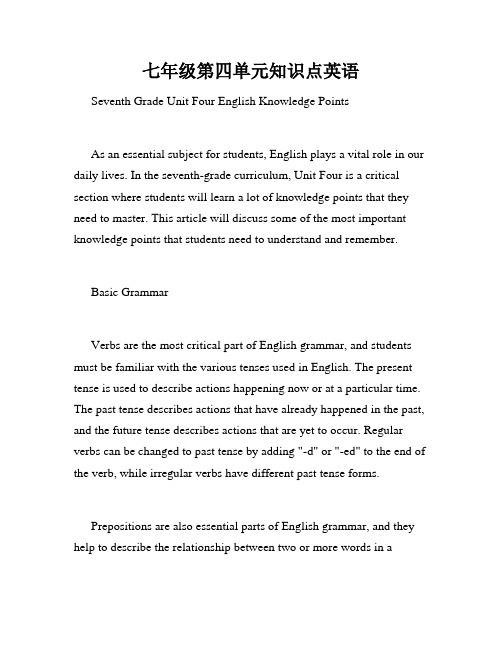
七年级第四单元知识点英语Seventh Grade Unit Four English Knowledge PointsAs an essential subject for students, English plays a vital role in our daily lives. In the seventh-grade curriculum, Unit Four is a critical section where students will learn a lot of knowledge points that they need to master. This article will discuss some of the most important knowledge points that students need to understand and remember.Basic GrammarVerbs are the most critical part of English grammar, and students must be familiar with the various tenses used in English. The present tense is used to describe actions happening now or at a particular time. The past tense describes actions that have already happened in the past, and the future tense describes actions that are yet to occur. Regular verbs can be changed to past tense by adding "-d" or "-ed" to the end of the verb, while irregular verbs have different past tense forms.Prepositions are also essential parts of English grammar, and they help to describe the relationship between two or more words in asentence. Examples of prepositions are "at," "in," "on," and "to." It is important to remember that a preposition is always used with an object.Pronouns are used to replace nouns in a sentence. They are very useful in avoiding repetition and making a sentence more concise. Examples of pronouns are "he," "she," "it," "they," "him," "her," and "them."VocabularyThe English language has a vast vocabulary, and learning new words is essential for effective communication. Students should learn new words by reading books, newspapers, and online articles. Learning synonyms and antonyms can also help students expand their vocabulary, and they should practice using the new words in sentences to help them remember them.Reading ComprehensionReading comprehension is an essential skill in English, and students need to develop their ability to understand texts deeply. They should read widely on diverse topics and practice answering questions on thetexts. It is also essential to develop a reading strategy, such as skimming and scanning, to help them understand texts better.Writing SkillsWriting is an essential part of English, and students should learn how to write different types of texts, such as letters, essays, and reports. They should also learn how to write using various formats, such as narrative, descriptive, and persuasive writing. Students should practice writing regularly, noting the correct use of grammar, punctuation, and spelling.Listening and Speaking SkillsListening and speaking are critical skills in English, and students should develop their skills in both areas. They should listen to English being spoken by native speakers and practice speaking English with others. Speaking English helps to develop confidence, fluency, and accuracy, and it enhances communication skills.ConclusionThe knowledge points discussed in this article are essential for students to master in the seventh-grade English curriculum. English is a language that requires consistent practice and dedication to become proficient. Students need to have a good foundation in basic grammar, vocabulary, reading comprehension, writing skills, listening, and speaking. With this foundation, they will be well equipped to deal with the challenges of learning English, and they will be able to communicate effectively in the language.。
ten-four词源

ten-four词源
"Ten-four" 是一种口语表达,通常用于美国和加拿大的无线电
通讯中,表示“明白,收到”。
这个短语的词源可以追溯到美国的
警察和卡车司机之间的对话。
"Ten-four" 最初是在美国警察和卡车
司机之间的无线电通讯中使用的,用来表示对收到的信息的确认和
理解。
这个短语的起源可以追溯到无线电通讯的早期使用,当时为
了简化通讯并减少混淆,人们开始使用特定的代码和短语来代表常
见的信息和指令。
"Ten-four" 就是其中之一,用来表示“收到”或“明白”。
在语言和文化传播的过程中,这个短语逐渐被更广泛地接受和
使用,不仅限于警察和卡车司机之间的通讯,而是被更多人用于表
示对某人所说的话或指令的确认和理解。
现在,"ten-four" 已经成
为了一种常见的口语表达,被广泛应用于日常交流中,尤其在美国
和加拿大。
总的来说,"ten-four" 这个短语的词源可以追溯到美国警察和
卡车司机之间的无线电通讯,用来表示对收到的信息的确认和理解。
随着时间的推移,它逐渐被更广泛地接受和使用,成为了一种常见
的口语表达。
三一考试各个级别的具体分析
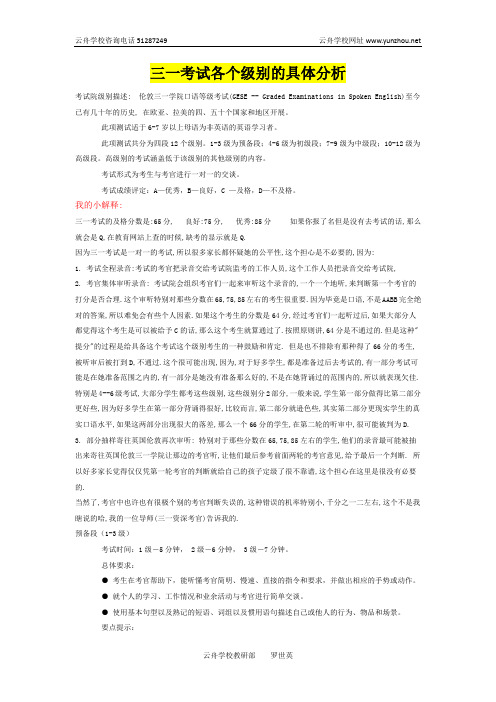
三一考试各个级别的具体分析考试院级别描述: 伦敦三一学院口语等级考试(GESE -- Graded Examinations in Spoken English)至今已有几十年的历史, 在欧亚、拉美的四、五十个国家和地区开展。
此项测试适于6-7岁以上母语为非英语的英语学习者。
此项测试共分为四段12个级别。
1-3级为预备段;4-6级为初级段;7-9级为中级段;10-12级为高级段。
高级别的考试涵盖低于该级别的其他级别的内容。
考试形式为考生与考官进行一对一的交谈。
考试成绩评定:A—优秀,B—良好,C —及格,D—不及格。
我的小解释:三一考试的及格分数是:65分, 良好:75分, 优秀:85分如果你报了名但是没有去考试的话,那么就会是Q,在教育网站上查的时候,缺考的显示就是Q.因为三一考试是一对一的考试,所以很多家长都怀疑她的公平性,这个担心是不必要的,因为:1. 考试全程录音:考试的考官把录音交给考试院监考的工作人员,这个工作人员把录音交给考试院,2. 考官集体审听录音: 考试院会组织考官们一起来审听这个录音的,一个一个地听,来判断第一个考官的打分是否合理.这个审听特别对那些分数在65,75,85左右的考生很重要.因为毕竟是口语,不是AABB完全绝对的答案,所以难免会有些个人因素.如果这个考生的分数是64分,经过考官们一起听过后,如果大部分人都觉得这个考生是可以被给予C的话,那么这个考生就算通过了.按照原则讲,64分是不通过的.但是这种"提分"的过程是给具备这个考试这个级别考生的一种鼓励和肯定. 但是也不排除有那种得了66分的考生,被听审后被打到D,不通过.这个很可能出现,因为,对于好多学生,都是准备过后去考试的,有一部分考试可能是在她准备范围之内的,有一部分是她没有准备那么好的,不是在她背诵过的范围内的,所以就表现欠佳.特别是4--6级考试,大部分学生都考这些级别,这些级别分2部分,一般来说,学生第一部分做得比第二部分更好些,因为好多学生在第一部分背诵得很好,比较而言,第二部分就逊色些,其实第二部分更现实学生的真实口语水平,如果这两部分出现很大的落差,那么一个66分的学生,在第二轮的听审中,很可能被判为D.3. 部分抽样寄往英国伦敦再次审听: 特别对于那些分数在65,75,85左右的学生,他们的录音最可能被抽出来寄往英国伦敦三一学院让那边的考官听,让他们最后参考前面两轮的考官意见,给予最后一个判断. 所以好多家长觉得仅仅凭第一轮考官的判断就给自己的孩子定级了很不靠谱,这个担心在这里是很没有必要的.当然了,考官中也许也有很极个别的考官判断失误的,这种错误的机率特别小,千分之一二左右,这个不是我瞎说的哈,我的一位导师(三一资深考官)告诉我的.预备段(1-3级)考试时间:1级-5分钟, 2级-6分钟, 3级-7分钟。
Get格雅Unit6AFrenchFourth课文翻译综合教程四

Unit-6-A-French-Fourth课文翻译综合教程四Unit 6A French FourthCharles Trueheart1Along about this time every year, as Independence Day approaches, I pull an old American flag out of a bottom drawer where it is folded away -folded in a square, I admit, not the regulation triangle. I’ve had ita long time and have always flown itoutside on July 4. Here in Paris it hangs from a fourth-floor balcony visible from the street. I’ve never seen anyone look up, but in my mind’s eye an American tourist may notice it and smile, and a French passerby may be reminded of the date and the occasion that prompt its appearance. I hope so.2For my expatriated family, too, the flag is meaningful, in part because we don’t do anything else tocelebrate the Fourth. People don’t have barbecues in Paris apartments, and most other Americans I know who have settled here suppress such outward signs of their heritage -or they go back home for the summer to refuel.3Our children think the flag-hanging is a cool thing, and I like it because it gives us a few moments of family Q&A about our citizenship.My wife and I have been away from the United States for nine years, and our children are eleven and nine, so American history is mostly something they have learned -or haven’t learn ed -from their parents. July 4 is one of the times when the American in me feels a twinge of unease about the great lacunae in our children’s understanding of who they are and isprompted to try to fill the gaps. It’s also a time, one among many, when my thoughts turn more generally to the costs and benefits of raising children in a foreign culture.4Louise and Henry speak French fluently; they are taught in French at school, and most of their friends are French. They move from language to language, seldom mixing them up, without effort or even awareness.This is a wonderful thing, of course.And our physical separation from our native land is not much of an issue.My wife and I are grateful every day for all that our children are not exposed to. American school shootings are a good object lesson for our children in the follies of the society we hold at a distance.5Naturally, we also want to remind them of reasons to take pridein being American and to try to convey to them what that means. It isa difficult thing to do from afar, andthe distance seems more than just a matter of miles. I sometimes think that the stories we tell them must seem like Aesop’s (or La Fontaine’s) fables, myths with no fixed place in space or time. Still, connections can be made, lessons learned.6Last summer we spent a week with my brother and his family, who live in Concord, Massachusetts, and we took the children to the North Bridge to give them a glimpse of the American Revolution. We happened to run across a reenactment of the skirmish that launched the war, with everyone dressed up in three-cornered hats and cotton bonnets. This probably only confirmed to our goggle-eyed kids themake-believe quality of American history.7Six months later, when we were recalling the experience at the family dinner table here, I asked Louise what the Revolution had been about.She thought that it had something to do with the man who rode his horse from town to town. “Ah〞, I said, satisfaction swelling in my breast, “and what was that man’s name?〞“Gulliver?〞Louise replied. Henry, for his part, knew that the Revolution was between the British and the Americans, and thought that it was probably about slavery.8As we pursued this conversation, though, we learned what the children knew instead. Louise told us that the French Revolution came at the end of the Enlightenment, when people learned a lot of ideas, and one wasthat they didn’t need kings to tell them what to think or do. On another occasion, when Henry asked what makes a person a “junior〞or a “II〞or a “III〞, Louise helped me answer by bringing up kings like Louis Quatorze and Quinze and Seize;Henry riposted with Henry VIII.9I can’t say I worry much about our children’s European frame of reference. There will be plenty of time for them to learn America’s pitifully brief history and to find out who Thomas Jefferson and Franklin Roosevelt were. Already they know a great deal more than I would have wished about Bill Clinton.10If all of this resonates with me, it may be because my family moved to Paris in 1954, when I was three, and I was enrolled in French schools for most of my grade-school years. Idon’t remember much instruction in American studies at school or at home. I do remember that my mother took me out of school one afternoon to see the movie Oklahoma! I can recall what a faraway place it seemed: all that sunshine and square dancing and surreys with fringe on top. The sinister Jud Fry personified evil for quite some time afterward. Cowboys and Indians were an American clichéthat had already reached Paris through the movies, and I asked a grandparent to send me a Davy Crockett hat so that I could live out that fairy tale against the backdrop of gray postwar Montparnasse.11Although my children are living in the same place at roughly the same time in their lives, their experience as expatriates is very different from mine. The particular narratives ofAmerican history aside, American culture is not theirs alone but that of their French classmates, too. The music they listen to is either “American〞or “European,〞but it is often hard to tell the difference. In my day little French kids looked like nothing other than little French kids;but Louise and Henry and their classmates dress much as their peers in the United States do, though with perhaps less Lands’ End fleeciness.When I returned to visit the United States in the 1950s, it was a five-day ocean crossing for a month’s home leave every two years; now we fly over for a week or two, although not very often. Virtually every imaginable product available to my children’s American cousins is now obtainable here.12If time and globalization havemade France much more like the United States than it was in my youth, then I can conclude a couple of things.On the one hand, our children are confronting a much less jarring cultural divide than I did, and they have more access to their native culture. Re-entry, when it comes, is likely to be smoother. On the other hand, they are less than fully immersed in a truly foreign world.That experience no longer seems possible in Western countries - a sad development, in my view.在法国庆祝美国独立日查尔斯·特鲁哈特1 每年差不多到了独立日日益临近的时候,我都会把一面折叠好的旧的美国国旗从底层抽屉里取出——我成认我折叠国旗不是官方规定的三角形,而是正方形。
三一口语三级
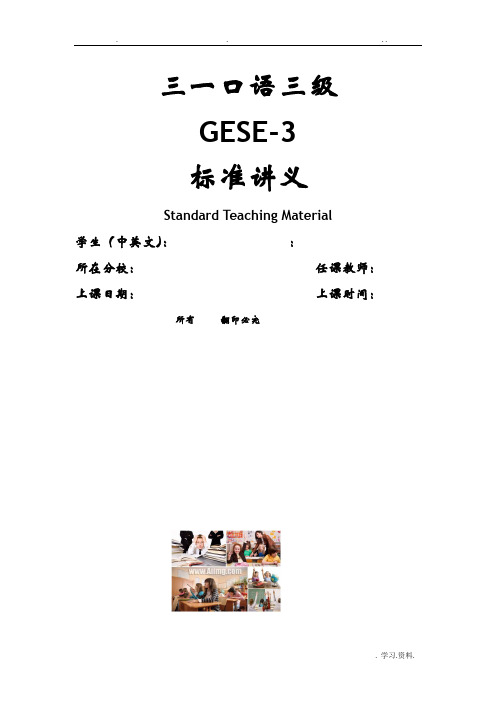
. . . .三一口语三级GESE-3标准讲义Standard Teaching Material学生(中英文)::所在分校:任课教师:上课日期:上课时间:所有翻印必究目录三一口语考试简介 (3)Unit 1 This is my school (5)Unit2 What does your father do? (9)Unit 3 What’s the date today? (12)Unit 4 When do you go to school? (16)Unit 5 ReviewUnit 6 What are they doing? (17)Unit 7 What’s the weather like today? (19)Unit 8 where were you yesterday morning? ................................................... (23)Unit 9 How can I get to the library? (24)三一口语三级问题库 (25)一、三一口语考试简介伦敦三一学院口语等级考试(GESE -- Graded Examinations in Spoken English)至今已有几十年的历史, 在欧亚、拉美的四、五十个国家和地区开展。
◆此项测试适于6-7岁以上母语为非英语的英语学习者。
◆此项测试共分为四段12个级别。
1-3级为预备段;4-6级为初级段;7-9级为中级段;10-12级为高级段。
◆高一级别的考试容均涵盖低于该级别的其它级别容。
◆考试形式为考生与考官进行一对一的交谈。
◆考试成绩评定:A—优秀,B—良好,C—及格,D—不及格。
二、三一口语三级考试涉及到的词汇:●有关工作的●有关当地场所的●有关学习场所的●有关家庭生活的●有关天气的●有关业余生活的●有关时间和日期的三、三一口语三级考试的所涉及的语言功能:●描述日常活动,事情和天气●表示时间和日期●表示“能”与“不能”,can & can't●简单地指示方向和地点●描述真实人物或图片中人物正在进行的活动●表述过去的状态●表示动态的介词:from, to, up, down, along, across●表示地点方位的介词:near, in front of, behind, opposite ●be 动词的过去式- was, were注意:从三级开始,要求考生能主动就所讨论的话题反问考官。
guess的复数形式

guess的复数形式猜测是人们在日常生活中经常进行的活动,而在英语中,由于名词的单复数形式不同,我们需要掌握各个名词的复数形式,以便在表达中使用准确的语法形式。
下面将为大家介绍一些常见名词guess的复数形式。
1.guess的复数形式是guesses。
在英语中,大多数名词单数形式直接在词尾加上-s构成复数形式,而guess则属于这种形式。
I made three correct guesses in the game last night.昨晚的游戏中,我猜对了三次。
2.guess的复数形式不变。
在某些情况下,名词的单复数形式是一样的,guess就属于这种特殊情况。
这样的名词通常指表示抽象概念的名词,不具备可数性。
He has so many wild guesses about the future.他对未来有很多不切实际的猜测。
3.guess的复数形式是guessings。
在极少数情况下,名词的复数形式会发生变化,guess是其中之一。
但是这种形式很少使用,在正式英语中几乎不会出现。
Her guessings about the weather were always inaccurate.她对天气的猜测总是不准确。
总结起来,guess的复数形式主要有guesses和guessings两种形式。
其中,guesses是最常用的复数形式,而guessings则很少使用。
理解和正确使用guess的复数形式,在日常英语交流中非常重要。
通过熟练运用这些语法形式,我们可以提高对外语的运用能力,使表达更加准确、自然。
记住这些规则,不再迷惑于名词的复数形式。
four 怎么读

four 怎么读
“four”的发音为英式音标/fɔː(r)/,美式音标/for/。
作为一个基础的数字词,“four”的基本含义是“四”或“四个”。
在数学和计数中,“four”代表数值4,是自然数序列中的第四个数字。
除了作为数字使用,“four”还有其他多种含义和用法。
它可以表示四个相同或相似的事物、人或观念,如“four seasons”表示“四季”。
此外,“four”还可以用作形容词,表示“四个的”或“四的”,如“four-door car”表示“四门车”。
在日常对话和语境中,“four”也经常被用来表达数量或程度的概念,如“I have four sisters.”(我有四个姐妹)或“This problem has four solutions.”(这个问题有四个解决方案)。
此外,“four”还有一些常见的表达方式,如“four o'clock”(四点钟)、“four directions”(四个方向)等。
这些表达方式在日常生活中非常常见,帮助我们更准确地描述和表达与数字4相关的概念。
总之,“four”是一个基础的数字词,具有多种含义和用法,既可以作为数字表示4,也可以作为形容词使用,用于计数、描述和表达数量或程度的概念。
了解“four”的基本含义和用法,可以帮助我们更准确地理解和使用这个词汇,更好地进行数学计算、物品描述和语言表达。
三一伦敦英语口语班的资料-GESE 4_5
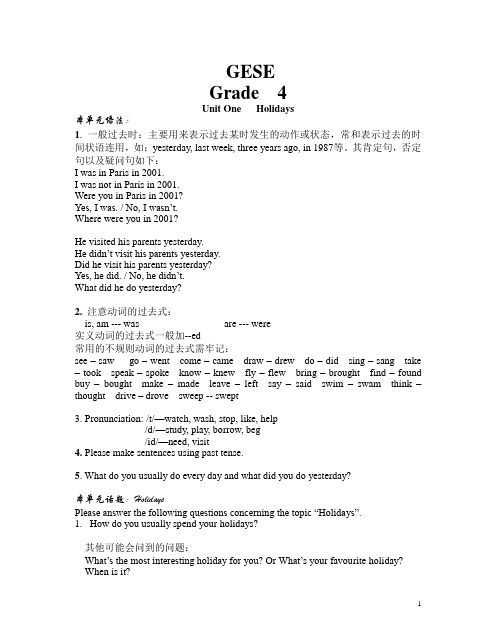
GESEGrade 4Unit One Holidays本单元语法:1. 一般过去时:主要用来表示过去某时发生的动作或状态,常和表示过去的时间状语连用,如:yesterday, last week, three years ago, in 1987等。
其肯定句,否定句以及疑问句如下:I was in Paris in 2001.I was not in Paris in 2001.Were you in Paris in 2001?Yes, I was. / No, I wasn’t.Where were you in 2001?He visited his parents yesterday.He didn’t visit his parents yesterday.Did he visit his parents yesterday?Yes, he did. / No, he didn’t.What did he do yesterday?2.注意动词的过去式:is, am --- was are --- were实义动词的过去式一般加--ed常用的不规则动词的过去式需牢记:see – saw go – went come – came draw – drew do – did sing – sang take – took speak – spoke know – knew fly – flew bring – brought find – found buy –bought make –made leave –left say –said swim –swam think –thought drive – drove sweep -- swept3. Pronunciation: /t/—watch, wash, stop, like, help/d/—study, play, borrow, beg/id/—need, visit4. Please make sentences using past tense.5. What do you usually do every day and what did you do yesterday?本单元话题:HolidaysPlease answer the following questions concerning the topic ―Holidays‖.1.How do you usually spend your holidays?其他可能会问到的问题:What’s the most interesting holiday for you? Or What’s your favourite holiday? When is it?How do you celebrate it? (Do you receive gifts from your parents or friends? Do you have a special dinner (feast) with your family? Do you sing or dance? Do you have a party on that day?)2.Do you like traveling? What places have you ever been to?提示:Yes, I do. I have (ever) been to Dalian, Guilin , Beidaihe and so on.3. Can you tell me something about your most interesting trip?When did you go there?Whom did you go with?How did you get there?How long did you stay there?Where did you stay? In a hotel?What did you do and what did you see there?How did you feel after the trip? Did you enjoy yourself? (interesting, tired, relaxed, fantastic, great, have a good time)4. Please compare the place with Beijing. (Can you tell me the difference between the place and Beijing? Or How is the place different from Beijing? )提示: The air is cleaner in Dalian than in Beijing.Dalian is more beautiful than Beijing.There are many more people in Beijing.In summer, it’s much cooler in the north.5. What do you like most about holidays?Unit Two Hobbies本单元话题: Hobbies 与sportsI. HobbiesPlease answer the following questions concerning the topic ―Hobbies‖.1. What’s your hobby? 或者Have you got a hobby? If you have, what is it?2. When did you take up your hobby? (或者When did you start this hobby?)3. How much time do you spend on your hobby each week?4. Is your hobby very expensive? 或者How much money do you spend on your hobby every month? 或者Do you have to spend a lot of money on your hobby?5. Why do you like it?提示:interesting, lovely, relaxing, cheap, easyIt can make me happy.It can make my life colorful.I can do something different from study.I can relax myself.II. Sports(该话题可以看成是Hobbies的一种)Please answer the following questions concerning the topic ―Sports‖.1.Do you like sports?2. What kind of sports do you like best? (What’s your favourite sports?)提示:play basketball / tennis / badminton / pingpang / volleyball / football / bowling / golfgo jogging / swimming / climbing / biking / skating / skiinghigh jump, long jump, javelin,do judo / yoga / kongfu3. What kind of sports are you good at?4.How often do you work out / have sports/exercise?5.Where/When/With whom do you usually have sports?6. How long / How many hours / How much time do you spend on sports every day?7. Why do you like sports?提示:It makes me feel happy / relaxed / fresh / energetic / goodIt helps me to keep fit (stay healthy).It can increase my height.It is exciting.It helps me to live longer.It helps me to lose weight.Assignments:1. Review what we have learned today.2. Please answer all the questions in―本单元话题:Hobbies and Sports‖Unit Three Shopping本单元语法:1. am / is / are going to do 表示将来计划或打算干某事例:We are going to have a party this weekend.We are not going to have a party this weekend.Are you going to have a party this weekend?Yes, we are. (No, we aren’t.)What are you going to do this weekend/2. Now, please answer the following questions.What are you going to do after the oral test is over?What are you going to do tomorrow morning?How are you going home after the oral test? (=How are you going to go home after the oral test?)本单元话题:shoppingPlease answer the following questions concerning the topic ―shopping‖.1.Do you often go shopping?提示:Yes, I do. / No, I don’t. My mother often goes shopping.go window shopping (只看不买)2.What do you usually buy?提示:clothes (shirts, dresses, skirts, coats, caps, shoes, sweater, pants), vegetables(mushroom, cabbage, bean), fruits( apples, bananas, strawberry, watermelon, pear, grape, peach), pens, pencils, schoolbags, meat (pork, beef, mutton, chicken, duck, fish ), noodles, toys, milk, eggs, bread3.Where do you usually go shopping?提示: in a store (shop), in a supermarket4. Why do you choose to go there?提示: cheap, expensive, reasonable, pretty, nice, design, style, attractive, material, fresh food, bargain, many kinds of goods, a variety of goods, smart, service, satisfactory, quality5. How often do you go shopping in a supermarket?6. How do you like going shopping in a supermarket?I like it very much. / I don’t like it at all.7. Have you ever tried on-line shopping?No, I haven’t. I’m afraid I may be cheated. On-line shopping is not reliable. Some people cheat on line.I don’t know how to shop on line.It’s not convenient for me to get on line.Yes, I have.What did you buy on line last time?I bought …8. What do you think of on-line shopping? / Can you compare on-line shopping with in-store shopping? / What’s the difference between on-line shopping and in-store shopping? / What’s the advantage and disadvantage of on-line shopping?The goods are cheaper on line.It’s more convenient to shop on line.Assignments:1. Review what we have learned today.2. Please answer all the questions in―本单元话题:shopping‖Unit Four Food, Job and Weekend Activities本单元语法I. 形容词的比较级和最高级small nice happy hot old fast slow high cheap cool warm cold low quiet young tall quick bright big sad fat thin noisy pretty beautiful expensive exciting interesting difficult important convenientgood bad manyExamples:Mary is taller than Joan.He is the cleverest boy in our class.There are more people in Beijing than in Shanghai.Zhongshan Park is the most beautiful park I know.In summer, it’s cooler in Be idaihe than in Beijing.Now, it’s your turn to make sentences.2. 能听懂并会使用always, usually, often, sometimes, seldom, never, but等词。
gest词根词缀
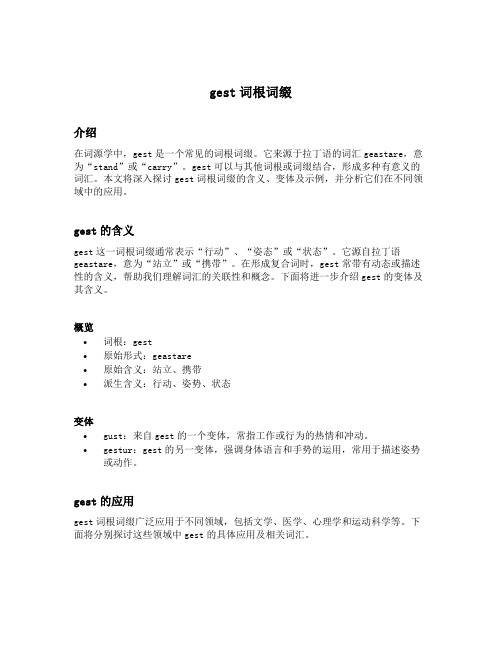
gest词根词缀介绍在词源学中,gest是一个常见的词根词缀。
它来源于拉丁语的词汇geastare,意为“stand”或“carry”。
gest可以与其他词根或词缀结合,形成多种有意义的词汇。
本文将深入探讨gest词根词缀的含义、变体及示例,并分析它们在不同领域中的应用。
gest的含义gest这一词根词缀通常表示“行动”、“姿态”或“状态”。
它源自拉丁语geastare,意为“站立”或“携带”。
在形成复合词时,gest常带有动态或描述性的含义,帮助我们理解词汇的关联性和概念。
下面将进一步介绍gest的变体及其含义。
概览•词根:gest•原始形式:geastare•原始含义:站立、携带•派生含义:行动、姿势、状态变体•gust:来自gest的一个变体,常指工作或行为的热情和冲动。
•gestur:gest的另一变体,强调身体语言和手势的运用,常用于描述姿势或动作。
gest的应用gest词根词缀广泛应用于不同领域,包括文学、医学、心理学和运动科学等。
下面将分别探讨这些领域中gest的具体应用及相关词汇。
文学在文学作品中,gest常用于描绘角色的动作、姿态和状态。
以下是一些常见字词:1.gestate:意为“怀孕”、“孕育”,在文学作品中可以指代创意或想法的形成和成长的过程。
2.gestural:描述与手势和身体动作相关的事物或行为,如“gesturallanguage”(手势语言)。
3.gesturer:表示在文学中扮演角色的姿势或动作的人,词根gest在其构词中得到了运用。
医学在医学领域中,gest词根词缀被用来描述生理学过程、疾病状况以及治疗方法。
以下是一些相关词汇:1.congest:表示某个器官或血管内积聚液体或血液,导致阻塞或充血。
2.congestive heart failure:充血性心力衰竭,指心脏泵血能力下降,导致血液在身体中无法有效流动。
心理学在心理学领域中,gest词根词缀被运用到描述情绪、感觉和行为的词汇中。
三一口语等级考试三级相关材料
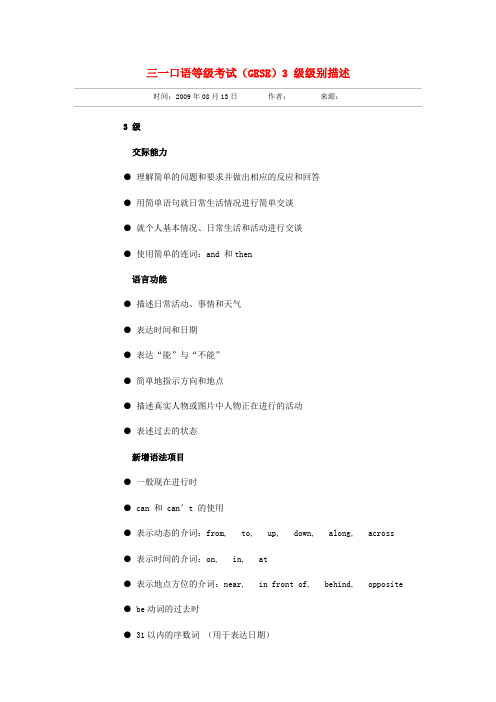
三一口语等级考试(GESE)3 级级别描述时间:2009年08月13日作者:来源:3 级交际能力● 理解简单的问题和要求并做出相应的反应和回答● 用简单语句就日常生活情况进行简单交谈● 就个人基本情况、日常生活和活动进行交谈● 使用简单的连词:and 和then语言功能● 描述日常活动、事情和天气● 表达时间和日期●表达“能”与“不能”● 简单地指示方向和地点● 描述真实人物或图片中人物正在进行的活动● 表述过去的状态新增语法项目● 一般现在进行时● can 和can’t 的使用● 表示动态的介词:from, to, up, down, along, across ● 表示时间的介词:on, in, at● 表示地点方位的介词:near, in front of, behind, opposite ● be动词的过去时● 31以内的序数词(用于表达日期)● 使用简单的连词:and 和 then词汇● 有关工作的● 有关当地场所的● 有关学习场所的● 有关家庭生活的● 有关天气的● 有关业余活动的● 有关时间和日期的语音● 使用上述相关词汇时发音正确● 正确使用缩略形式如I’m,I’ve● 正确使用单词的基本重音和短句的基本语调三一口语三级语法解析时间:2009年08月13日作者:来源:新增语法项目:一般现在进行时can 和can’t 的使用表示动态的介词:from, to, up, down, along, across 表示时间的介词:on, in, at 表示方位的介词:near, in front of, behind, opposite be动词的过去时31以内的序数词(用于表达日期)3级三一口语等级考试(GESE)能力要求解析时间:2009年08月13日作者:来源:百度知道3级交际能力:理解简单的问题和要求并做出相应的反应用简单语句交谈日常生活描述日常生活和活动,简单介绍本人情况使用简单的连词:and, and then语言功能:描述日常生活和天气表达时间和日期表达能做什么、不能做什么指明方位描述正在进行的活动描述过去的状态新增语法项目:一般现在进行时can 和can’t 的使用表示动态的介词:from, to, up, down, along, across 表示时间的介词:on, in, at 表示方位的介词:near, in front of, behind, opposite be动词的过去时31以内的序数词(用于表达日期)使用简单的连词:and, and then词汇:有关工作的有关个人熟悉的社区场景,学习场所的有关家庭生活的有关天气的有关业余时间活动的有关时间和日期的语音:单词发音准确正确使用缩略形词组读音(如I’m, I’ve)单词与短句的基本重音和语调三一口语考试三级历次考官问题 07年10月时间:2008年03月03日作者:来源:学而思教育Sample questions Grade 3:1. 有关时间和日期的: What time(when) do you usually get up?What's the date today? What day is it today?2. 有关业余时间的: Do you have classes at the weekends?What do you usually do after school or class?3. 有关天气的: What's the weather like today?What was the weather like yesterday?4. 有关家庭生活和个人熟悉的场景a) What did you study in your school?b) What (kind of) subject do you like ?c) Is your home/house far from your school? How far is it?d) Which subject do you like best?5. What are xxx doing?6. What were they doing yesterday?7. Can you do xxx?合格要求:能用一到两句话进行完整的简单回答,反应比较迅速,没有极端的语法错误;过去时、进行时和方位的描述。
高中英语选修4单词表
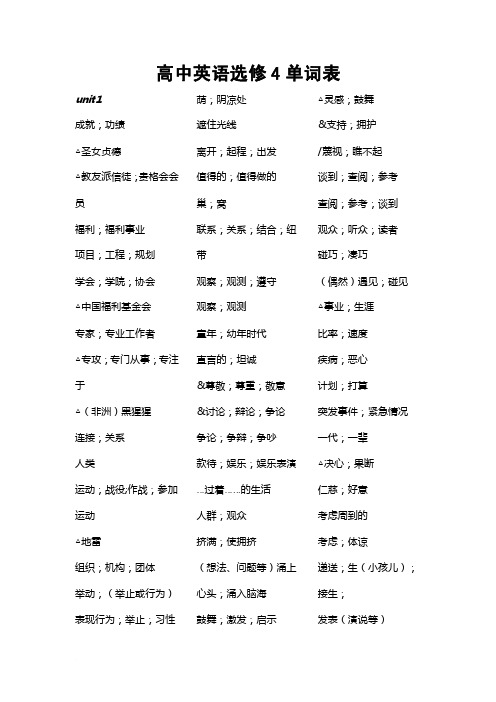
高中英语选修4单词表unit1成就;功绩△圣女贞德△教友派信徒;贵格会会员福利;福利事业项目;工程;规划学会;学院;协会△中国福利基金会专家;专业工作者△专攻;专门从事;专注于△(非洲)黑猩猩连接;关系人类运动;战役;作战;参加运动△地雷组织;机构;团体举动;(举止或行为)表现行为;举止;习性荫;阴凉处遮住光线离开;起程;出发值得的;值得做的巢;窝联系;关系;结合;纽带观察;观测;遵守观察;观测童年;幼年时代直言的;坦诚&尊敬;尊重;敬意&讨论;辩论;争论争论;争辩;争吵款待;娱乐;娱乐表演…过着……的生活人群;观众挤满;使拥挤(想法、问题等)涌上心头;涌入脑海鼓舞;激发;启示△灵感;鼓舞&支持;拥护/蔑视;瞧不起谈到;查阅;参考查阅;参考;谈到观众;听众;读者碰巧;凑巧(偶然)遇见;碰见△事业;生涯比率;速度疾病;恶心计划;打算突发事件;紧急情况一代;一辈△决心;果断仁慈;好意考虑周到的考虑;体谅递送;生(小孩儿);接生;发表(演说等)继续;坚持谦虚的;谦让的;适度的unit2(常用)数据;统计;统计数字;统计资料晒黑的&斗争;拼搏;努力十年;十年期特级的;超级的△混合的;杂种的杂交种;混血儿产量;输出△(植物的)品种;种类庄稼;农作物;产量饥饿;欲望&(使)饥饿引起烦恼的;令人不安的&使变大;伸展&循环;流传越南(东南亚国家)幸亏;由于;因为战役;战斗;较量;斗争&搏斗;奋斗摆脱;除去…摆脱;除去对……感到满意自由;自主宁愿;宁可因为;所以;因而&配备;装备△高粱谷物;粮食;颗粒△花生&输出;出口国籍工作;职业;占领△性格;个性;人格使迷惑;使为难遗憾;惋惜遗憾;懊悔化学的;关于化学的△有机的;器官的;组织的△肥沃的;富饶的△肥料;化肥生产;制造(的复数形式)细菌害虫;害兽;害鸟逐渐增强;建立;开发导致;造成(后果)营养;滋养;食物矿物;矿石发现;发觉焦点;中心点集中;聚集集中(注意力、精力等)于土壤减少;减缩…/使……免受(影响;害等);使……不含(有害物)△(=)大豆根;根源浏览;略读画底线标出;强调总结;摘要;概要评论;议论&表达意见;作出评论△生产者;制片人△工业的;产业的unit3幽默;滑稽△故事、笑话等中的妙语;关键语△口头的△不用语言的△哑剧△查理•卓别林(英国喜剧大师)△爱德华•李尔(英国作家、画家)喜剧△维克多•雨果(法国文学家)直到现在△使更愉快;使更有希望△忧愁的;沮丧的满足的;满意的满足使满足/对……满足表演者;演出者使惊诧令人感到惊讶的幸运的;吉利的不幸地穷的;缺少的△十几岁(13至19岁的年龄)平常的;普通的厌烦的△微妙的;精巧的;技艺精湛的&使欢乐;款待△愉快的;有趣的△迷人的;有魅力的△流浪汉;行乞者遍及;贯穿到处;始终;全部无家的;无家可归的小胡子用旧的;用坏的;破烂的△-磨破的;穿旧的△僵硬地失败(者)△乐观;乐观主义&(,)战胜;克服△失败者;处于劣势的一方△暴风雪皮革挑出;辨别出△饰带;花边;鞋带切断;断绝高中英语选修6单词表第3页(共6页)&嚼碎;咀嚼(食物)△一口;满口△享受;欢乐;乐趣使信服令人信服的&导演;指示;指挥直的;直接的;直率的担任主角;主演△奥斯卡突出的;杰出的;显著的瑞士(欧洲中部国家)△信心;信念△服装;戏装姿态;手势做手势特殊的;特别的细节;细目特殊地;特别地时刻;场合预算;开支女演员&(使)滑动;(使)滑行滑;滑动;幻灯片使发笑;使愉快△好笑的;有趣的烙饼;薄饼解释;讲解;说明侦探△夏洛克•福尔摩斯多山的;山一般的耳语;低语&低语;小声说巨大的;辽阔的△节奏脏或乱的状态作出反应;回应粥;麦片粥醉的unit4陈述;说明&迎接;问候代表;象征社团;联系;联想宿舍食堂飞行;航班好奇的好奇地△加西亚(姓)哥伦比亚(南美洲国家)&接近;靠近;走近接近;方法;途径面颊保护;保卫保卫……以免受防御;保卫主要的(,)误解,误会误解;误会△永田明△艾哈迈德•阿齐兹约旦(西亚国家)△达琳•库隆猛冲;突进成人;成年人成人的;成熟的△简单地;只△&穆斯林(的);伊斯兰教信徒(的)口语的未说出口的;非口语的△姿态;体态西班牙(欧洲国家)意大利(欧洲国家)可能的很可能……;有希望……总的来说;通常十字路口△雇员△皱眉;蹙额△读错;误解面部的作用;功能;职能起作用;运转安逸;舒适减轻(痛苦;忧虑)舒适;快活;自由自在真实地;真诚地;真正地错误的;假的怒气;怒火丢脸’背对;背弃拳头打呵欠△恭敬的主观的&拥抱等级;军衔磁带unit5题目;主题(曲)△卡默洛特公园(位于英国)中心的;中央的△中央公园(位于美国纽约)△多莱坞(公园名,位于美国)不同的;各种各样的漫画;动画片以……而闻名△过山车无论哪一个;任何一个△海盗;盗版△神话故事;童话幻想;怪念头消遣;娱乐(活动)秋千;摇摆&(,)摇摆;摆动有吸引力的事物;吸引难怪;不足为奇旅游业无论在什么地方;各处独一无二的;仅有的木匠高中英语选修6单词表第5页(共6页)△匠人;能工巧匠引擎;发动机△秃头的保存;保留保护区长度;长行动;事迹△骑士;爵士根据……模仿;仿造△魔术师梅林剑△(指中世纪骑士)骑着马用长予打斗锦标赛;联赛移民;殖民者运动的译员;翻译少数;少数民族布△观测未来(公园名,位于法国)丛林△潜水员生物;动物阳光△霸王龙&前进;促进;提前提前高级的;先进的商标;牌子接近活跃起来外出;短途旅行;远足允许进入;入场费;承认往返汽车;航天飞机高速公路纪念品运动鞋(作宣传或介绍用的)小册子;指南。
圣三一口语GESE4课件

read a newspaper
go shopping
play golf
go to work
Q: What are you going to do this weekend? A: I'm going to ...
go out with
go
friends skateboarding
play tennis
>> Questions that are related to today's topic
1. What do you usually do on the weekend? 2. What are you going to do this weekend? 3. What do/don't you like about the weekend? 4. What do you do with your family on the weekend? 5. What do you do on your own?
>> (B) present your topic. Then discuss it by asking questions.
• What information do you get from the boy's presentation? • If you can ask him a question about his presentation, what would you ask?
Q: What's ... going to do this weekend? A: He's/She's going to ...
>> ( C ) practice with your partner
gese_grade4
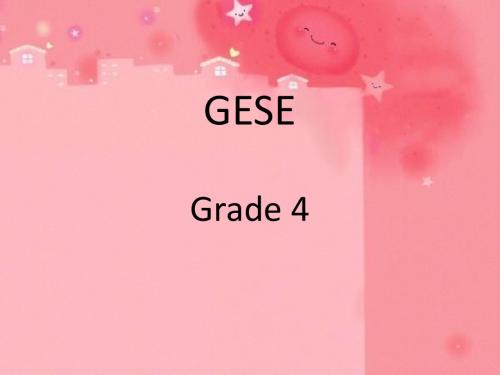
语言功能 ● 讲述过去的事情 ● 谈论未来的计划和打算 ● 表达简单的比较 ● 表达好恶 ● 表述动作发生的方式和频繁程度 词汇 ● 与自选话题相关的词汇 ● 与对话话题相关的词汇 ● 表示动作发生频繁程度的副词和词组,如: sometimes, often, never, every day, once a week • ● 表示过去时间的副词,如:yesterday, last night • • • • • • • • • •
• 语音 • ● 避免出现背诵式的演讲语调 • ● 正确使用与自选话题和对话话题相关词汇的发 音和句子的语音语调 • ● 语流中恰当使用弱式发音 • ● 过去时结尾‘ed’的三种不同发音,如: played /-d/, walked /-kt/, wanted /-id/ • 新增语法项目 • ● Like+动名词或不定式 • ● 规则动词和常用不规则动词的一般过去时 • ● 用going to 表示将来要做或要发生的事情 • ● 表示方式与频繁程度的副词 • ● 形容词的比较级和最高级● 连词 but
三一口语四级考试大纲
交际能力第一部分: 自选话题 ● 就所列的4个讲述点给予陈述 ● 根据考官所提问题做出回答,并有所讨论;若考官有要求, 应提供更多的事实和细节 ● 向考官提出至少一个与自选话题相关的问题 ● 尽可能运用本级所要求的语言功能 第二部分: 对话 ● 正确理解考官的提问,回答切题 ● 用简单语言与考官进行讨论 ● 简短直接地与考官进行适度的交流
Grade 4
• 考试时间:10分钟 • 考试内容:两部分 1.自选话题。2对话题目。 • 总体要求:●能理解、熟悉话题中所述的 要点 ●参与对话,就个人感兴趣或与 日常生活相关的熟悉话题进行交流并陈述 个人意见、看法 ●具备一定的语言能力描述经历、 发生的事情,说明事情原因,并能就意见、 看法及计划作出说明解释
动词名词化 四格宾语

动词名词化四格宾语动词名词化指的是将动词转化为名词的过程,而四格宾语则是德语语法中的一个概念,指的是动词所带的四个宾语。
在德语中,宾语分为四个格:第一格(主格)、第二格(属格)、第三格(与格)和第四格(宾格)。
动词名词化通常是通过在动词词尾添加名词后缀或使用动名词形式来实现的。
这样转化后的动词具有了名词的特性,可以作为主语、宾语、表语等。
而四格宾语则是指动词所带的四个宾语,它们分别是:1.第一格宾语(Akkusativobjekt):也称为直接宾语,是动词的直接承受者,通常位于动词之后。
例如:在德语中,“Ich sehe das Haus.”(我看见这座房子。
)中的“das Haus”就是第一格宾语。
2.第二格宾语(Dativobjekt):也称为间接宾语,通常表示动词的接受者或受益者,位于动词之后、第一格宾语之前。
例如:在德语中,“Ich gebe dir das Buch.”(我给你这本书。
)中的“dir”就是第二格宾语。
3.第三格宾语(Dativobjekt mit Präposition):也称为介词宾语,通常与介词一起使用,表示动词的方向、时间、方式等。
例如:在德语中,“Ich schicke ihm eine Postkarte.”(我给他寄一张明信片。
)中的“ihm”就是第三格宾语。
4.第四格宾语(Genitivobjekt):也称为所有格宾语,表示动词所关联的人或事物的所有者或拥有者,位于动词之前。
例如:在德语中,“Das Haus gehört mir.”(这座房子属于我。
)中的“mir”就是第四格宾语。
需要注意的是,不是所有的动词都可以带四个宾语,而且不同的动词所带的宾语也不同。
因此,在使用四格宾语时需要根据具体的语境和语法规则来确定。
总之,动词名词化和四格宾语都是语言学中的重要概念,它们可以帮助我们更好地理解和运用语言。
如果需要了解更多关于语言学和德语语法的知识,建议查阅相关书籍或咨询专业人士。
- 1、下载文档前请自行甄别文档内容的完整性,平台不提供额外的编辑、内容补充、找答案等附加服务。
- 2、"仅部分预览"的文档,不可在线预览部分如存在完整性等问题,可反馈申请退款(可完整预览的文档不适用该条件!)。
- 3、如文档侵犯您的权益,请联系客服反馈,我们会尽快为您处理(人工客服工作时间:9:00-18:30)。
请大家完成以下几篇小作文,每篇80字左右,为将来考试用,所以请同学认真准备:1.What is you favorite Chinese festival?When is it?What do you know about it?What is the traditional food?What do people often do? (活动要典型,这个节日特有的。
)What did you do last … Festival? (讲述你上一个节日干了什么?)I like many Chinese traditional festivals such as Mid-autumn Festival, Dragon boat festival and Lantern Festival. But Spring Festival is my favorite Chinese traditional festival. It is the most important festival in China just like Christmas in the West. It's also called chinese new year or lunar new year. The date of spring festival is different each year but it's usually in Jan or Feb. Or we can say It's on lunar January 1st.Before new year, people usually docorate their house with lucky words. The character Fu is very popular. It means good luck or blessing. Many people put the character Fu upside down on the front door of their house. This means that good fortune has arrived at the home. In Chinese it calls 福到. On Spring Festival Eve, we will stay up and watch the special show on CCTV. At the midnight on New Years Eve people usually celebrate with firecrackers. Children can get a lot of lucky money when they pay New Year’s visit. We often have a lot of traditional food like dumplings, rice cake and buns in Spring Festival.Last Spring Festival I went back to my father’s hometown and celebrated Spring Festival with my grandfather. He lives in Zhejiang province. It's on the east of China. We went there by plane. My grandpa cooked a lot of delicious food like lamb, beef, pork, fish as well as some vegetables. He is also good at making dumplings and noodles. I played fireworks a lot with my relatives at night. My grandfather and my relatives gave me a lot of gift money when I gave them New Year’s greetings. It was a wonderfu l experience. I would rather to go there again in the future.2.What book have you read recently?(注意多用现在完成时)Who is the author? What do you know about him/her?What kind of book is it? What is the book about? What is the story?Why do you like it? What is the special part of the book?Is it popular among classmate ?Recently I have read a book called My childhood. This book is written byMaxim Gorky. He was born in 1868.He was from Russia. He was one of the world's greatest writers. His famous trilogy of autobiography was My childhood, In the world and My universities. My childhood is the first book of trilogy. It talked about writer's miserable grow experience in his childhood. But even in such brutal and hard situation, the writer never gave up confidence and bravery of life. His father was died when he was 5 years old. He had to move to live in his grandparents' family. His grandfather, his uncles and cousins treated him not well. But he learned from kind grandmother and hardworking, honest workers. Poor and tough life made him have much stronger character to face difficulties. I really enjoy this book because I can learn a lot of good character from the writer. My father has told me this story when I was 7 years old.3.What movie have you seen recently? (注意多用现在完成时)What is the movie?When and where did you see it?What kind of movie is it? What is your favorite kind of movie?Who is the director? Who is the leading actor/actress?Is it popular?How do you like it?There are many kinds of movies like science fiction, war movies, comedies, dramas,musical and horror movies. But I prefer science fiction because it is more exciting and some science fiction is made in 3D. The visual effect is wonderful. I have seen Transformers and it's sequel,2012 and recently I have seen Avatar with my father at Xingmei moive theater.It is the best science fiction I have ever seen. The leading actor Sam is quite new but the director James Cameron is world famous.His another famous movie was Titanic. I heard it took the director 10 years to make Avatar. Avatar is a real hollywood blockbuster. So far it is the highest box office in the movie history.4.Describe a recent experience 描述你的一次近期个人经历(一定要有意思) What did you do last month/week?When? Where? Who? What happened?How did you like it?I went to Beidanhe with my parents on this National Holiday. My father drove car to get there. I went to the beach to see the sunrise and I took a lot of beautiful pictures. I also ate lots of delicious seafood such as crabs, shrimps, jellyfish and oysters. But the most fantastic experience was thatwe went the Qinghuangdao safari park. It's in the National Forrest Park. Safari park will definetely let you have different feelings compare with traditional zoo tour because animals in the safari park is not in the cages . They can walk and run freely in the large forrest area. We drove our car through the safari park to get closer to the fierce animals. The first animal came close to our car is an Africa lion! This is my first time I saw the lion so closely. A lion was walking close to me and staring at me.I felt scared and almost could not say a word.My father drove the car slowly. When I came to tigers area I felt a little better. I saw some tigers were walking to look for foods, some tigers were sitting for relax. I took my digital camera quickly to take some pictures for tigers. When I came to bear area , I saw lots of brown bears were very friendly to stand close to the road waiting for food from passing car. I threw some bread for bears and saw bears accept the food with their mouth. It was very fun but I couldn't feed any more because I thought it was still dangerous. It took us about 80 minutes to drive through the fierce animals park including lions, tigers,bears ,wolves and wild boars. It was really the most wonderful advenure I have ever experienced. I wish I would go there again in the future.。
